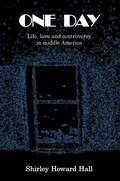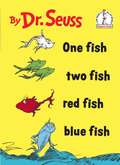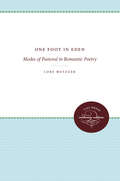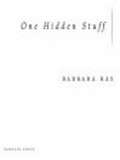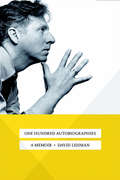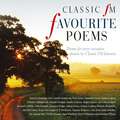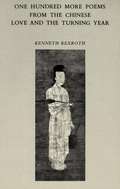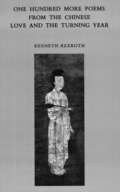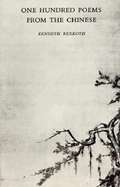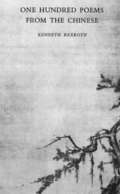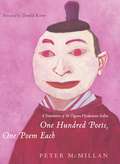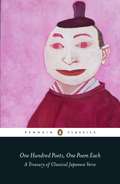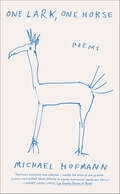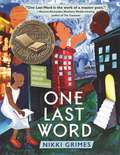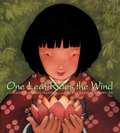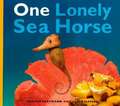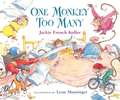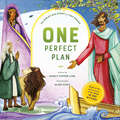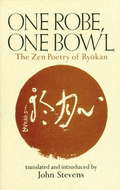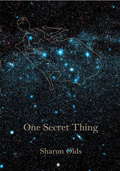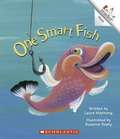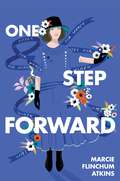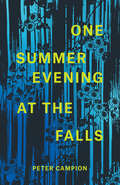- Table View
- List View
One Day: Life, love and controversy in middle America
by Shirley Howard HallOne Day is a collection of poems which highlights the issues and challenges facing mankind in the 20th and 21st centuries. Politics, religion, socio-economic issues, and a need for natural resources led to numerous campaigns on the battlefield, and on the middle class. Issues challenging the poor and the middle class were world wide issues, and in an attempt to spread democracy; conflicts became the order of the day.
One Fish, Two Fish, Red Fish, Blue Fish
by Dr Seuss"This one, I think, is called a Yink. He likes to wink, he likes to drink. He likes to drink, and drink, and drink. The thing he likes to drink is ink. The ink he likes to drink is pink. He likes to wink and drink pink ink."
One Foot in Eden: Modes of Pastoral in Romantic Poetry
by Lore MetzgerA UNC Press Enduring Edition -- UNC Press Enduring Editions use the latest in digital technology to make available again books from our distinguished backlist that were previously out of print. These editions are published unaltered from the original, and are presented in affordable paperback formats, bringing readers both historical and cultural value.
One Hidden Stuff
by Barbara RasUsing long-lined, imaginative leaps to connect the everyday with the miraculous, the intimate with the visionary, Barbara Ras's poems surge across the page like waves crashing on a beach. She crafts the forty-one new poems in this collection with a zany and spacious cunning that reaches from family to community, from what's cherished to what's lost, from culture to nature. .
One Hidden Stuff
by Barbara RasUsing long-lined, imaginative leaps to connect the everyday with the miraculous, the intimate with the visionary, Barbara Ras's poems surge across the page like waves crashing on a beach. She crafts the forty-one new poems in this collection with a zany and spacious cunning that reaches from family to community, from what's cherished to what's lost, from culture to nature.
One Hundred Autobiographies: A Memoir
by David LehmanIn One Hundred Autobiographies, poet and scholar David Lehman applies the full measure of his intellectual powers to cope with a frightening diagnosis and painful treatment for cancer. No matter how debilitating the medical procedures, Lehman wrote every day during chemotherapy and in the aftermath of radical surgery. With characteristic riffs of wit and imagination, he transmutes the details of his inner life into a prose narrative rich in incident and mental travel. The reader journeys with him from the first dreadful symptoms to the sunny days of recovery.This "fake memoir," as he refers ironically to it, features one-hundred short vignettes that tell a life story. One Hundred Autobiographies is packed with insights and epiphanies that may prove as indispensable to aspiring writers as Rilke's Letters to a Young Poet.Set against the backdrop of Manhattan, Lehman summons John Ashbery, Kenneth Koch, Edward Said, and Lionel Trilling among his mentors. Dostoyevsky shows up, as does Graham Greene. Keith Richards and Patti Hansen put in an appearance, Edith Piaf sings, Clint Eastwood saves the neighborhood, and the Rat Pack comes along for the ride. These and other avatars of popular culture help Lehman to make sense of his own mortality and life story. One Hundred Autobiographies reveals a stunning portrait of a mind against the ropes, facing its own extinction, surviving and enduring.
One Hundred Favourite Poems: Poems for all occasions, chosen by Classic FM listeners
by Classic FmThis delightful anthology is a timeless collection of poems chosen by Classic FM listeners.With humorous limericks, romantic sonnets, traditional and modern classics, this book is a true refelction of the greatest and best-loved verse. Discover poems for special occasions, as well as poems to suit any mood.Whether you're reading them for the first time or revisiting a classic, this is a selection to enchant, move and delight. Classic FM Favourite Poems is an essential collection for every bookshelf.Poets include:Edward Lear, Sir John Betjeman, William Wordsworth, Robert Burns, William Shakespeare, Robert Frost, Pam Ayres, Hilaire Belloc, John Donne, Cole Porter, Jenny Joseph, Lord Byron.Which poem has topped the list? Will it be Keats or Yeats, Jenny Joseph or Oscar Wilde? Find out how your favourite poem has rated.(P)2009 Hodder & Stoughton
One Hundred More Poems from the Chinese: Love and the Turning Year
by Kenneth RexrothThis is a collection of translations from Chinese done down the years solely to please myself. It is offered with no pretense to scholarship or to mastery of that complex subject, Sinology.
One Hundred More Poems from the Chinese: Love and the Turning Year
by Kenneth RexrothAn assemblage of delicate Chinese verse which delicately explore the worlds of love, nature, and meditation. Love and the Turning Year includes a selection from the Yueh Fu--folk songs from the Six Dynasties Period (fourth-fifth centuries A.D.). Most of the songs are simple, erotic lyrics. Some are attributed to legendary courtesans, while others may have been sung at harvest festivals or marriage celebrations. In addition to the folk songs, Rexroth offers a wide sampling of Chinese verse: works by 60 different poets, from the third century to our own time. Rexroth always translated Chinese poetry--as he said--"solely to please myself." And he created, with remarkable success, English versions which stand as poems in their own right.
One Hundred Poems from the Chinese
by Kenneth RexrothThirty-five poems by Tu Fu make up the first part of this volume. The translator then moves on to the Sung Dynasty (10th-12th centuries) to give us a number of poets of that period, much of whose work was not previously available in English: Mei Yao Ch'en, Su Tung P'o, Lu Yu, Chu Hsi, Hsu Chao, and the poetesses Li Ch'ing Chao and Chu Shu Chen. There is a general introduction, biographical and explanatory notes on the poets and poems, and a bibliography of other translations of Chinese poetry.
One Hundred Poems from the Chinese
by Kenneth RexrothThe lyrical world of Chinese poetry in faithful translations by Kenneth Rexroth. The lyric poetry of Tu Fu ranks with the greatest in all world literature. Across the centuries--Tu Fu lived in the T'ang Dynasty (731-770)--his poems come through to us with an immediacy that is breathtaking in Kenneth Rexroth's English versions. They are as simple as they are profound, as delicate as they are beautiful. Thirty-five poems by Tu Fu make up the first part of this volume. The translator then moves on to the Sung Dynasty (10th-12th centuries) to give us a number of poets of that period, much of whose work was not previously available in English. Mei Yao Ch'en, Su Tung P'o, Lu Yu, Chu Hsi, Hsu Chao, and the poetesses Li Ch'iang Chao and Chu Shu Chen. There is a general introduction, biographical and explanatory notes on the poets and poems, and a bibliography of other translations of Chinese poetry.
One Hundred Poets, One Poem Each: A Translation of the Ogura Hyakunin Isshu
by Peter McmillanCompiled in the thirteenth century, the Ogura Hyakunin Isshu is one of Japan's most quoted and illustrated works, as influential to the development of Japanese literary traditions as The Tale of Genji and The Tales of Ise. The text is an anthology of one hundred waka poems, each written by a different poet from the seventh century to the middle of the thirteenth, which is when Fujiwara no Teika, a renowned poet and scholar, assembled and edited the collection. The book features poems by high-ranking court officials and members of the imperial family, and each is composed in the waka form of five lines with five syllables in the first and third lines and seven syllables in the second, fourth, and fifth ( waka is a precursor of haiku). Despite their similarity in composition, these poems evoke a wide range of emotions and imagery, and touch on themes as varied as frost settling on a bridge of magpie wings to the continuity of the imperial line. Though the Ogura Hyakunin Isshu has been translated into English before, many scholars and other translators have struggled with the formality of the original text, often padding lines in order to conform to the original syllabic model or rearranging the poems to create unnecessary rhyme. In this bold new translation, Peter McMillan uses only the words that are necessary to evoke the original sensations these poems once gave their readers. The poems are accompanied by calligraphic versions in Japanese and line drawings of the individual poets. Explanatory notes place the poems in context, and an appendix includes both the poems' Japanese typed and romanized versions. The Ogura Hyakunin Isshu is an excellent introduction to Japan and its special lyric tradition.
One Hundred Poets, One Poem Each: A Treasury of Classical Japanese Verse
by Peter MacMillanA new edition of the most widely known and popular collection of Japanese poetry.The best-loved and most widely read of all Japanese poetry collections, the Ogura Hyakunin Isshu contains 100 short poems on nature, the seasons, travel, and, above all, love. Dating back to the seventh century, these elegant, precisely observed waka poems (the precursor of haiku) express deep emotion through visual images based on a penetrating observation of the natural world. Peter MacMillan's new translation of his prize-winning original conveys even more effectively the beauty and subtlety of this magical collection.Translated with an introduction and commentary by Peter MacMillan.
One Lark, One Horse: Poems
by Michael HofmannA new collection of poems by Michael Hofmann—his first in twenty yearsMichael Hofmann, renowned as one of our most brilliant critics and translators, is also regarded as among our most respected poets. Hofmann’s status—he is the author of “one of the definitive bodies of work of the last half-century" (The Times Literary Supplement)—is all the more impressive for his relatively concentrated output. One Lark, One Horse is his fifth collection of poems since his debut in 1983, and his first since Approximately Nowhere in 1999. Tt is also one of the most anticipated gatherings of new work in years. In style, his voice is as unmistakable as ever—sometimes funny, sometimes caustic; world-facing and yet intimate—and this collection shows a bright mind burning fiercely over the European and American imaginations. The poet explores where he finds himself, geographically and in life, treating with wit and compassion such universal themes as aging and memory, place, and the difficult existence of the individual in an ever-bigger and more bestial world.One Lark, One Horse is a remarkable assemblage of work that will delight loyal readers and enchant new ones with Hofmann’s approachable, companionable voice.
One Last Word: Wisdom from the Harlem Renaissance
by Nikki GrimesEach poem is paired with one-of-a-kind art from today's most exciting African American illustrators--including Pat Cummings, Brian Pinkney, Sean Qualls, James Ransome, Javaka Steptoe, and many more--to create an emotional and thought-provoking book with timely themes for today's readers.
One Leaf Rides the Wind
by Celeste MannisA young girl makes her way slowly through a Japanese garden where she spots one leaf, two carved temple dogs, three miniature bonsai, and four startled birds. This counting book introduces the youngest readers to the beauty and hidden secrets of a Japanese garden. It also introduces haiku, with ten poems that are simple and straightforward. The rhythmic haiku appear in a context that will make perfect sense to young readers. Each page contains additional information about the scene shown, the loveliness of the garden can't be ignored.
One Lonely Sea Horse
by Saxton Freymann Joost ElffersOne lonely sea horse learns that she has a lot of friends--friends she can really "count" on to help.
One Monkey Too Many
by Jackie French Koller Lynn MunsingerPlay is the order of the day for a group of vacationing monkeys determined not to let any silly rules get in their way. But when one monkey too many joins the crowd, everyone's in for some hilarious surprises.
One Perfect Plan: The Bible's Big Story in Tiny Poems
by Nancy Tupper LingA picture book that introduces young readers to the story of the Bible—all in one sitting!—and invites them into God&’s great plan. &“Chau&’s beautiful, flowing illustrations bring to life the story of the Bible told in Ling&’s short rhymes.&”—School Library JournalOne Perfect Plan is a fun, accessible retelling of biblical tales through engaging poems by Nancy Tupper Ling—each three to six lines long—and breathtaking illustrations by Alina Chau.Start with memorable Old Testament stories, from Adam and Eve, Noah and the Flood to Daniel and the Lion's Den. Then explore iconic stories from the New Testament including the birth of Jesus, His death and resurrection, and the promise of new life in Christ! Whether at bedtime, during a snack, or even just getting ready for the day, families can get through the Bible's entire story arc and discover God&’s redemptive plan for them in a singular read-aloud.One word—then light breaks into darkness;the sky, the seas, and life—how wondrous!One world—now broken as sin enters in.How will our Father restore it again?One God—whose plan is perfect and true—will bring new life to me and to you.
One Robe, One Bowl: The Zen Poetry of Ryokan
by John StevensThe hermit-monk Ryokan, long beloved in Japan both for his poetry and for his character, belongs in the tradition of the great Zen eccentrics of China and Japan. His reclusive life and celebration of nature and the natural life also bring to mind his younger American contemporary, Thoreau. Ryokan's poetry is that of the mature Zen master, its deceptive simplicity revealing an art that surpasses artifice. Although Ryokan was born in eighteenth-century Japan, his extraordinary poems, capturing in a few luminous phrases both the beauty and the pathos of human life, reach far beyond time and place to touch the springs of humanity.
One Secret Thing
by Sharon OldsSharon Olds completes her cycle of family poems in a book at once intense and harmonic, playful with language, and rich with a new self-awareness and sense of irony.The opening poem, with its sequence of fearsome images of war, serves as a prelude to poems of home in which humor, anger, and compassion sing together with lyric energy--sometimes comic, sometimes filled with a kind of unblinking forgiveness. These songs of joy and danger--public and private--illuminate one another. As the book unfolds, the portrait of the mother goes through a moving revisioning, leading us to a final series of elegies of hard-won mourning. One Secret Thing is charged throughout with Sharon Olds's characteristic passion, imagination, and poetic power.The doctor on the phone was young, maybe on hisfirst rotation in the emergency room.On the ancient boarding-school radio,in the attic hall, the announcer had given myboyfriend's name as one of twobrought to the hospital after the sunriseservice, the egg-hunt, the crash--one of themcritical, one of them dead. I was looking at thestairwell banisters, at their lathing,the necks and knobs like joints and bones,the varnish here thicker here thinner--I had saidWhich one of them died, and now the world wasan ant's world: the huge crumb of eachsecond thrown, somehow, up ontomy back, and the young, tired voicesaid my fresh love's name.from "Easter 1960"From the Trade Paperback edition.
One Smart Fish
by Laura ManivongA child tries to catch a fish using such bait as hot dog meat, cookie dough, and spaghetti.
One Step Forward
by Marcie Flinchum AtkinsA Junior Library Guild Gold Standard Selection!One Step Forward is a compelling debut YA historical fiction novel in verse about Matilda Young—the youngest American suffragist imprisoned for picketing the White House to demand women’s right to vote.Raised in a politically divided family, Matilda wondered if she could be as courageous as her older sister who fought for suffrage. Joining the radical protest movement came with plenty of risk. Women were routinely scorned, harassed, arrested—and worse. And taking a stand for her rights could tear her family apart.Told in powerful verse, One Step Forward follows Matilda's coming-of-age journey as she takes her first step into action. Amid the backdrop of World War I, Matilda’s story vividly highlights the extreme mental, physical, and emotional battles faced by the protestors leading up to the passage of the Nineteenth Amendment. It also reveals the bravery, hard work, and spirit of the women who paved the way for future generations to use their voices and votes.
One Summer Evening at the Falls (Phoenix Poets)
by Peter CampionThe poems in this collection capture the fantastic feeling of falling in love, all while keeping eyes on its lifecycles of crashing aftermaths, lingering regrets, guilt, and renewal. Peter Campion brings us to a series of scenes—on the damp patio, in the darkroom, and along the interstate—where we find familiar characters, lovers, and strangers. In the title poem, he takes us to the falls, where people and passions mix amid the sticky hanging mists: That charge of summer nights, that edge, like everyone’s checking everyone out. Lingering a moment in the crowd gathered to watch the rush and crash and let the mist drift upward to our faces, I’m here: the future feels open again. Even alone tonight—still: open. Campion’s poems introduce us to a range of people, all of whom are rendered with distinctiveness and intimacy. Their voices proliferate through the collection, with lyric folding into speech, autobiography becoming dramatic monologue, and casual storytelling taking on a ritualistic intensity. The poems in One Summer Evening at the Falls show how each character and each moment can be worthy of love and that this love both undoes us and makes us who we are. In narrative and lyric, in formal verse and free, Campion brings contemporary playfulness together with his classical talent to create this far-reaching and tender collection.
One Summer Evening at the Falls (Phoenix Poets)
by Peter CampionThe poems in this collection capture the fantastic feeling of falling in love, all while keeping eyes on its lifecycles of crashing aftermaths, lingering regrets, guilt, and renewal. Peter Campion brings us to a series of scenes—on the damp patio, in the darkroom, and along the interstate—where we find familiar characters, lovers, and strangers. In the title poem, he takes us to the falls, where people and passions mix amid the sticky hanging mists: That charge of summer nights, that edge, like everyone’s checking everyone out. Lingering a moment in the crowd gathered to watch the rush and crash and let the mist drift upward to our faces, I’m here: the future feels open again. Even alone tonight—still: open. Campion’s poems introduce us to a range of people, all of whom are rendered with distinctiveness and intimacy. Their voices proliferate through the collection, with lyric folding into speech, autobiography becoming dramatic monologue, and casual storytelling taking on a ritualistic intensity. The poems in One Summer Evening at the Falls show how each character and each moment can be worthy of love and that this love both undoes us and makes us who we are. In narrative and lyric, in formal verse and free, Campion brings contemporary playfulness together with his classical talent to create this far-reaching and tender collection.
